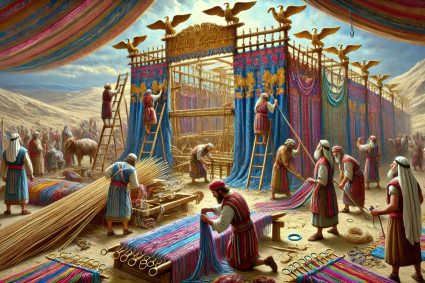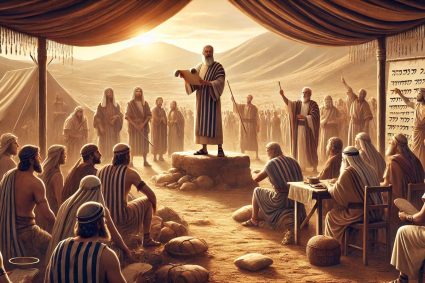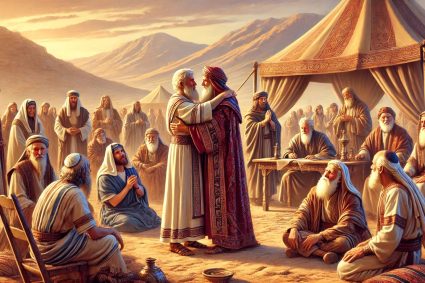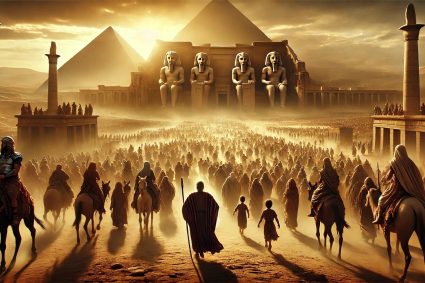
November 28, 2024
DAILY BIBLE READING – Romans Chapter 4
1 What shall we say then that Abraham our father, as pertaining to the flesh, hath found?
2 For if Abraham were justified by works, he hath whereof to glory; but not before God.
3 For what saith the scripture? Abraham believed God, and it was counted unto him for righteousness.
4 Now to him that worketh is the reward not reckoned of grace, but of debt.
5 But to him that worketh not, but believeth on him that justifieth the ungodly, his faith is counted for righteousness.
6 Even as David also describeth the blessedness of the man, unto whom God imputeth righteousness without works,
7 Saying, Blessed are they whose iniquities are forgiven, and whose sins are covered.
8 Blessed is the man to whom the Lord will not impute sin.
9 Cometh this blessedness then upon the circumcision only, or upon the uncircumcision also? for we say that faith was reckoned to Abraham for righteousness.
10 How was it then reckoned? when he was in circumcision, or in uncircumcision? Not in circumcision, but in uncircumcision.
11 And he received the sign of circumcision, a seal of the righteousness of the faith which he had yet being uncircumcised: that he might be the father of all them that believe, though they be not circumcised; that righteousness might be imputed unto them also:
12 And the father of circumcision to them who are not of the circumcision only, but who also walk in the steps of that faith of our father Abraham, which he had being yet uncircumcised.
13 For the promise, that he should be the heir of the world, was not to Abraham, or to his seed, through the law, but through the righteousness of faith.
14 For if they which are of the law be heirs, faith is made void, and the promise made of none effect:
15 Because the law worketh wrath: for where no law is, there is no transgression.
16 Therefore it is of faith, that it might be by grace; to the end the promise might be sure to all the seed; not to that only which is of the law, but to that also which is of the faith of Abraham; who is the father of us all,
17 (As it is written, I have made thee a father of many nations,) before him whom he believed, even God, who quickeneth the dead, and calleth those things which be not as though they were.
18 Who against hope believed in hope, that he might become the father of many nations, according to that which was spoken, So shall thy seed be.
19 And being not weak in faith, he considered not his own body now dead, when he was about an hundred years old, neither yet the deadness of Sarah’s womb:
20 He staggered not at the promise of God through unbelief; but was strong in faith, giving glory to God;
21 And being fully persuaded that, what he had promised, he was able also to perform.
22 And therefore it was imputed to him for righteousness.
23 Now it was not written for his sake alone, that it was imputed to him;
24 But for us also, to whom it shall be imputed, if we believe on him that raised up Jesus our Lord from the dead;
25 Who was delivered for our offences, and was raised again for our justification.
King James Version. Public Domain
Commentary
Introduction
Romans Chapter 4 is dedicated to the central role of faith for righteousness before God and uses Abraham as a paradigmatic example. Paul argues that Abraham’s justification did not occur through the law or through works, but solely through his faith. This chapter illustrates that faith is universal and includes both Jews and Gentiles. Paul shows that Abraham is not only the father of Israel but also of all believers who accept God’s promises through faith.
Commentary
Abraham as a Model of Faith (Verses 1–5): Paul begins by stating that Abraham was not justified by works. Instead, his faith was credited to him as righteousness. This contradicts the idea that righteousness is a merit earned by works and underscores that it comes solely by grace through faith. Paul emphasizes that faith in the God who justifies the wicked is the key to righteousness.
David and the Blessedness of the Forgiven (Verses 6–8): Paul quotes David to show that the forgiveness of sins is an act of grace and does not depend on works. The blessedness that David describes consists in God not counting a person’s sins against them. This emphasizes that righteousness is a gift from God and not attained through human effort.
Righteousness Independent of Circumcision (Verses 9–12): Paul emphasizes that Abraham received the righteousness of faith before he was circumcised. Circumcision was merely a sign and a seal of this righteousness that he already had by faith. Thus, Abraham becomes the father of all who believe—both the circumcised and the uncircumcised. This underscores the universality of faith.
The Promise and Faith (Verses 13–17): Paul makes it clear that the promise to make Abraham the heir of the world was given not through the law but through faith. The law brings wrath and transgression, while faith secures the promise. Abraham’s faith shows that God’s promises are based on grace and apply to all who share Abraham’s faith.
Abraham’s Unwavering Faith (Verses 18–22): Paul praises Abraham’s faith, which did not waver despite the apparent impossibility of the promise to become the father of many nations. Abraham trusted that God has the power to fulfill His promises. Therefore, his faith was credited to him as righteousness.
The Significance for Believers (Verses 23–25): Paul concludes by stating that Abraham’s faith is not only valid for him but also serves as an example for us. Righteousness is credited to us when we believe in the One who raised Jesus from the dead. The resurrection of Jesus is the decisive proof of our justification and the fulfillment of God’s promise.
Summary
Romans Chapter 4 highlights the central role of faith for righteousness, independent of works, the law, or circumcision. Abraham is portrayed as the father of faith, whose righteousness was founded solely on his faith in God’s promises. Paul demonstrates that this righteousness applies not only to Jews but to all believers. God’s promise is based on grace and is received through faith. This chapter encourages trusting in God’s power and faithfulness, as Abraham did, and shows that the resurrection of Jesus is the foundation of our justification.
![]()

WEEKLY SPIRIT OF PROPHECY READING – Ellen White | The Desire of Ages
Chapter 77—In Pilate’s Judgment Hall
This chapter is based on Matthew 27:2, 11-31; Mark 15:1-20; Luke 23:1-25; John 18:28-40; John 19:1-16
Read online here
Commentary
Introduction
The chapter concerning Jesus’ trial before Pilate is a climax of the Gospels, where divine truth and human weakness collide. Pilate faces the challenge of choosing between justice and his own interests, while the Jewish leaders express their hatred through lies and manipulation. The story reveals profound lessons about power, hypocrisy, and the steadfastness of Christ.
Commentary
The Role of Pilate:
Pilate, the Roman governor, appears weak and indecisive, torn between his recognition of Jesus’ innocence and his desire to yield to the demands of the Jewish leaders. His inability to act according to his convictions leads not only to the condemnation of Christ but also to his own moral and political downfall. Pilate’s actions demonstrate how dangerous it is to sacrifice principles for personal gain.
The Attitude of Jesus:
Throughout the trial, Jesus remains calm and majestic. His silence speaks louder than words, and his behavior reflects his complete dedication to the divine plan. He offers Pilate the opportunity to recognize the truth, but Pilate misses the chance. Jesus’ patience and gentleness stand in stark contrast to the shouts of the priests and the crowd.
The Responsibility of the Jewish Leaders:
The priests and elders use lies and false accusations to impose their will. They shout, “His blood be on us and on our children!” (Matthew 27:25), without understanding the far-reaching consequences of their words. Their rejection of Christ places them and their people under a burden that reverberates through history.
Barabbas or Jesus:
The choice between Barabbas and Jesus is symbolic of the decision each person must make. Barabbas, a murderer and rebel, is preferred, while Jesus, the Savior, is rejected. This choice reflects the tragedy when people reject the truth in favor of what is wrong.
The Consequences:
Pilate tries to distance himself from the guilt by washing his hands in innocence, but his responsibility remains. The decision to condemn Christ becomes a turning point that forever changes human history. At the same time, the story shows the fulfillment of the divine plan to save the world through Jesus’ death.
Summary
The chapter concerning Jesus’ trial before Pilate reveals the deep abysses of human sin and the sublime greatness of divine grace. Pilate’s weakness, the hypocrisy of the Jewish leaders, and the choice of the crowd teach us that rejecting the truth has devastating consequences. However, Jesus stands firm as the embodiment of grace and truth, fulfilling the plan of redemption even in the face of betrayal and injustice. This chapter challenges us to courageously stand for the truth in our lives and to follow Jesus’ example of patience and dedication.
(Visited 9 times, 1 visits today)




















